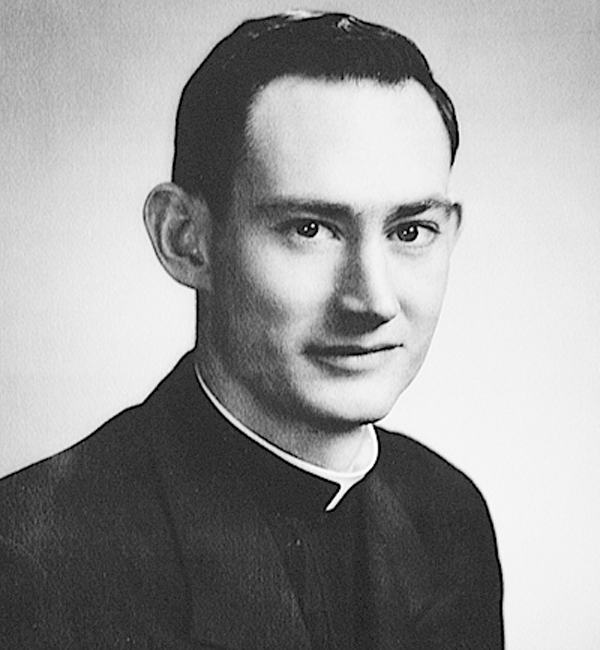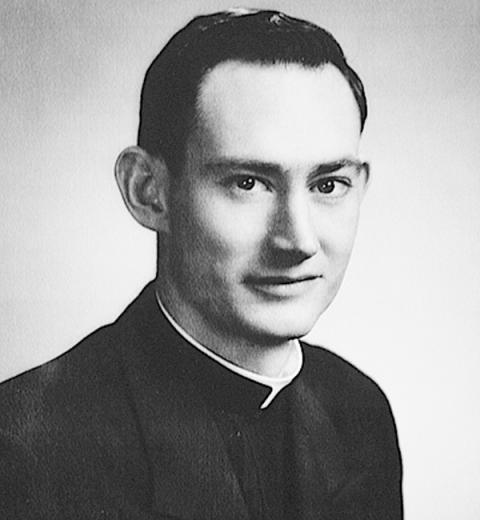
Fr. John Slattery (Provided photo)

Fr. John Slattery (Provided photo)
One night when I was a teenager, my friend and I stayed up to watch the late movie. The movie was maudlin, with lots of technicolor close-up deaths in which the dying, mostly women in full makeup and period costumes, looked suspiciously hale.
Suddenly, a commercial appeared, heralded by an announcer screaming, "Splatter Screen!" We collapsed in laughter because just two words summarized the movie, never mind that they turned out to be an advertisement for a kitchen tool. "Splatter Screen" entered our lexicon for anything treacly or overblown.
Sometimes I turn on the television news now and the first words that come to mind are "Splatter Screen!" Splatter Screen no longer sells just kitchen tools; it sells us nightmares and anxieties and mistrust, billions of dollars' worth every year.
So, when I read the December 2018 New York Times series on "4 Ways to Be Happier in 2019," I thought of two additions: Turn off the television and radio news, and if you can't do No. 1, then don't let bad news from a place you've never been involving people you do not know blind you to the goodness of the place where you do live and the people you do know.
I'm not suggesting that we should close our hearts or minds to the plight of distant strangers or distant lands. But I know too many friends and family members who become so distraught over remote disasters, whether occurring or predicted, that they are no longer able to see the joy right in front of them. Nor am I arguing that the news out of Syria, for example, isn't both terrible and true.
But the news of the child you teach who has just learned to read or the story of the kind neighbor who shovels the snow from your walk or the account of the friend who has returned alive and healed from the kingdom of chemotherapy, these things are also true.
Paying attention to that goodness, the goodness we can touch and hear and taste and see, brings wholeness and health and gratitude and, yes, with deference to the Times, increased happiness.
I thought of this when I sat in the church Fr. John Slattery and his parish built after years of worshiping in a rented space above a cafe. Hundreds of us had gathered for his funeral.
You haven't heard of John Slattery, either in his life or his death. He just lived his vocation, and that news neither bleeds nor leads. But hundreds of us had come to pay our respects to a good man, long ill and long retired, a man who, as our bishop emeritus reminded us, "wanted nothing more than to be a parish priest."
The bishop explained how John learned to be a parish priest "by falling in love with his people." Hundreds nodded, weeping, because we knew from experience that the words were true.
Advertisement
I recall a lunch when John told me that when he left seminary in the mid-1950s, "you couldn't find a more scrupulous priest." I asked him what changed. He said, "I started listening to the people I served. I learned a lot."
The funeral was attended by women and men who have labored long in the Catholic vineyard. We've taught in parishes and schools, taken our turns on committees, handled human resources and finances in the chancery, cleaned sacristies and rectories, served at the altar, led the choir and played the organ. We know hurt and disappointment. Each of us can say, along with Jesuit Fr. Walter Burghardt, that we "have seen more Christian corruption than you have read of. I have tasted it. I have been reasonably corrupt myself." We aren't naifs.
But we are also prone to forget the true and the beautiful before us, as how could we not be given the endless torrent of "Splatter Screen" headlines, by the unrelenting flow of bad news about the Catholic Church, breaking news that sometimes seems as if its purpose is to break those who consume it.
There was joy at John's funeral, as we remembered what we had seen with our own eyes and heard with our own ears and learned in our own lives, all from one faithful priest.
All of it also true.
It gave us the courage, again, to finish Burghardt's words with him:
And yet, I love this Church, this living, pulsing, sinning people of God. ... Why? For all the Christian hate, I experience here a community of love. For all the institutional idiocy, I find here a tradition of reason. For all the individual repressions, I breathe here an air of freedom. For all the fear of sex, I discover here the redemption of my body. In an age so inhuman, I touch here tears of compassion. In a world so grim and humorless, I share here rich joy. ... In the midst of death, I hear here incomparable stress on life. For all the apparent absence of God, I sense here the real presence of Christ.
It gave us the courage, again, to get back to work, the hard and messy and glorious unsung work of being church.
[Melissa Musick Nussbaum's latest book, with co-author Anna Keating, is The Catholic Catalogue: A Field Guide to the Daily Acts That Make Up a Catholic Life. Find her columns online at https://www.ncronline.org/columns/my-table-spread.]







